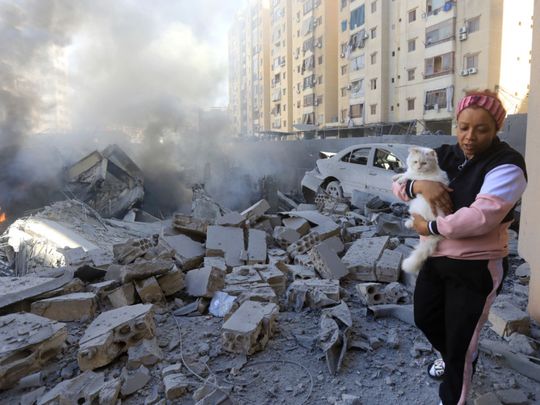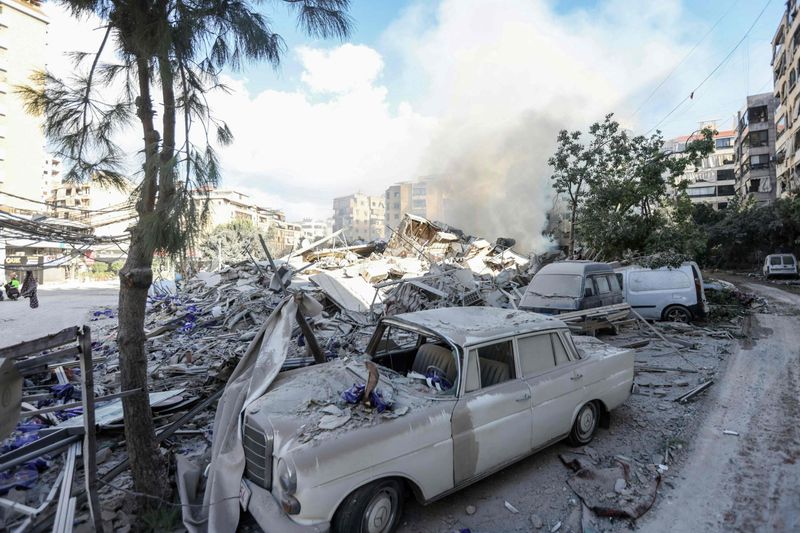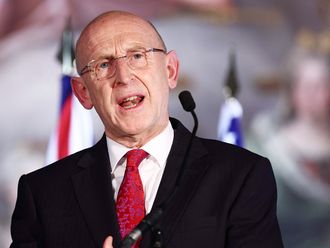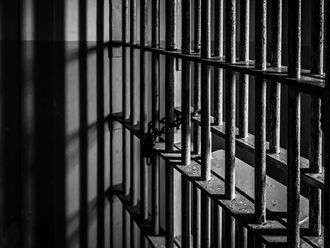
Dubai: Eight Israelis were killed on Wednesday as fighting with Hezbollah militants in Lebanon escalated, marking the first deaths of Israeli soldiers since cross-border raids began the previous day.
The Israeli commandos were all killed during a gun battle with Hezbollah operatives in a southern Lebanon village. Another Israeli officer and four soldiers were seriously wounded in the same incident, the Israeli military announced on Wednesday.
Hezbollah earlier said it destroyed three Israeli tanks as they advanced towards a Lebanese border village.
The Iran-backed group said it "destroyed three Merkava tanks with rockets as they advanced towards the village of Maroun Al Ras," referring to an area where they reported clashes with Israeli troops earlier in the day.
The ground battles began hours after Iran launched its second direct missile attack on Israel, prompting Prime Minister Benjamin Netanyahu to declare that Iran would pay for its “big mistake.”
Iran threatened an even larger retaliation if Israel followed through on its threats, as the fighting has already claimed over 1,000 lives in Lebanon since last week.
Israel shifted its focus from Gaza — where violence ignited after the October 7 attacks by Hamas — to securing its northern border.
Israeli forces intensified bombardments on Hezbollah’s stronghold in southern Beirut, where a significant blow was dealt last week with the killing of its leader, Hassan Nasrallah. Hezbollah claimed to have forced Israeli troops to retreat after they attempted to enter a border village, and reported ongoing clashes elsewhere.
The Lebanese army confirmed Israeli incursions, noting one soldier was wounded by an Israeli drone strike. In response to the rising hostilities, the Israeli military ordered evacuations in over 20 areas in southern Lebanon and continued its bombardment of Hezbollah targets, with reports of multiple explosions in the southern suburbs.
Iran’s missile attack
Hours after the ground operations began, Iran fired approximately 200 missiles at Israel, including hypersonic weapons, sending civilians into shelters.
Israel intercepted most missiles, with two injuries reported from shrapnel, and one missile damaging a school building.
Some Iranian missiles reportedly fell within Israeli air force bases without causing damage. In the occupied West Bank, a Palestinian was killed in Jericho when debris from a missile struck him.
Netanyahu condemned the missile attack, stating, “Iran made a big mistake tonight and will pay for it,” emphasising that Israel will retaliate against any attackers.
Defence Minister Yoav Gallant reiterated that those who attack Israel will face severe consequences.

Israel declares UN chief ‘persona non grata’
In a related diplomatic fallout, Israel declared UN chief Antonio Guterres “persona non grata,” accusing him of failing to condemn Iran’s missile attacks on Israel.
Foreign Minister Israel Katz criticised Guterres as an “anti-Israel Secretary-General” and labelled him a supporter of global terrorism.
“Anyone who cannot unequivocally condemn Iran’s heinous attack on Israel does not deserve to step foot on Israeli soil,” said Foreign Minister Israel Katz in a statement.
“This is an anti-Israel Secretary-General who lends support to terrorists, rapists, and murderers,” he said.
Katz added that Guterres, who he said supported the “murderers of Hamas, Hezbollah, the Houthis, and now Iran, the mothership of global terror, will be remembered as a stain on the history of the UN for generations to come”.
Following Iran’s missile attack on Israel late Tuesday, Guterres condemned the “broadening conflict in the Middle East”, slamming “escalation after escalation” in the region.
“This must stop. We absolutely need a ceasefire,” said Guterres.
However, Guterres on Wednesday condemned Iran’s attack. “As should have been obvious yesterday in the context of the condemnation I expressed,” Guterres told an emergency meeting of the UN Security Council, “I again strongly condemn yesterday’s massive missile attacks by Iran on Israel.”
Guterres called for an end to the “sickening cycle of escalation” in the Middle East.
The secretary-general was speaking at an emergency meeting of the UN Security Council, called after Iran on Tuesday launched a massive missile barrage at Israel, which has ramped up its offensive against Hezbollah in Lebanon.
“It is high time to stop the sickening cycle of escalation after escalation that is leading the people of the Middle East straight over the cliff,” the UN chief said.
“This deadly cycle of tit-for-tat violence must stop.”
Israel’s pledge to respond to the Iranian missile attack has raised fears of a spiralling region-wide war, sending diplomats scrambling for options to de-escalate the situation.
G7 leaders in emergency meeting
As tensions escalated, world leaders convened an emergency G7 meeting, urging both Iran and Israel to de-escalate the situation.
Italy, which holds this year’s G7 presidency, will host the extraordinary call on Wednesday. Foreign Minister Antonio Tajani told Parliament time was of the essence to avoid further escalation.
“There is still a chance we can avoid a war that could involve the entire Middle East,” he said. “We call on regional actors to act responsibly.”
“Iran risks setting the entire region on fire “this must be prevented at all costs,” German Chancellor Olaf Scholz said.
Israel Prime Minister Benjamin Netanyahu has vowed to retaliate against Iran after it fired about 200 ballistic missiles at Israel, a development that world powers fear could spiral into a broader regional war. Most of the missiles were intercepted.
Attacks in Denmark, Sweden
Simultaneously, attacks near Israeli embassies in Denmark and Sweden raised alarm as police investigated explosions and gunfire amid rising tensions.
With no injuries reported, authorities are still assessing potential links to the broader conflict. The situation remains volatile, with calls for a ceasefire becoming increasingly urgent as the spectre of war looms over the Middle East.
Many countries have launched evacuation operations and warnings to their nationals in Lebanon since Israel launched its ground raids into its neighbour and Iran fired missiles at Israel.












